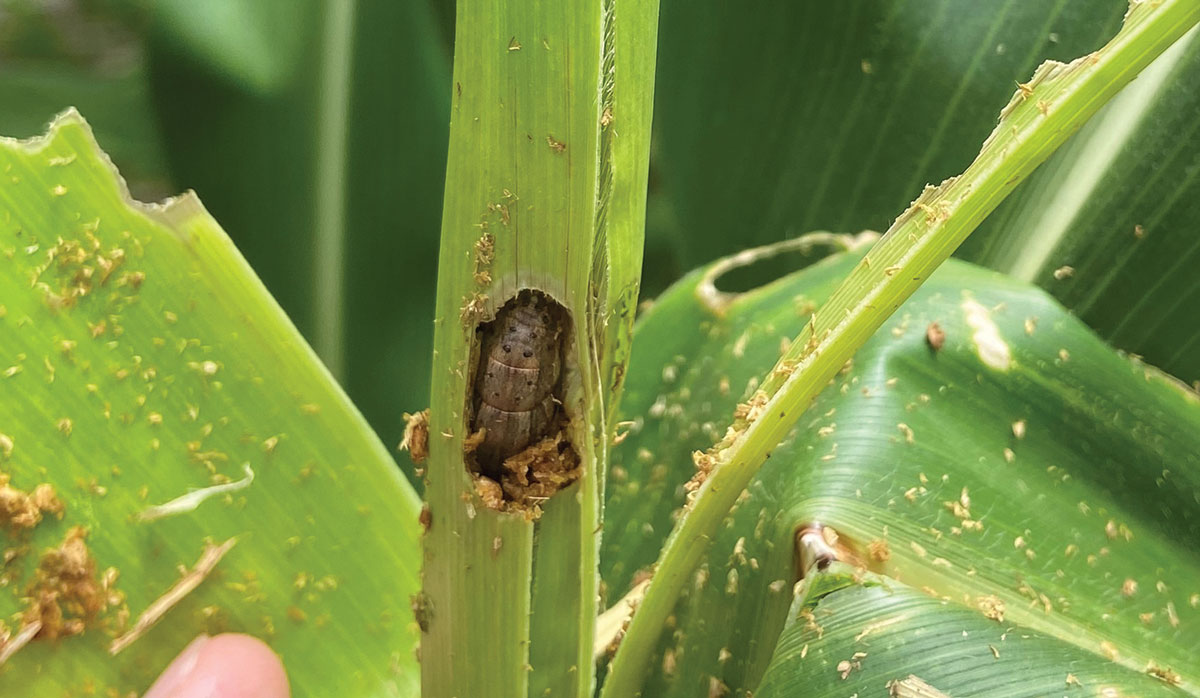Three new grower directors appointed to FAR board
Effective from 1 January 2026, there will be three new grower directors on the board of the Foundation for Arable Research (FAR).
Early detection and action are key to keeping fall armyworm populations under control, preventing economic damage to maize and sweetcorn crops, according to Foundation for Arable Research (FAR).
FAR biosecurity spokesman Ivan Lawrie says that early monitoring of crops is advised, especially in milder regions such as Northland, Auckland and Waikato where the tropical pest may over-winter.
Fall armyworm (FAW) can attack crops at all stages, but its control is much more effective when larvae are small and are feeding on leaves. Treatment is best between maize plant emergence and growth stage V6, before larvae can hide in the whorl.
Application of an insecticide is only economic for maize if more than 20% of the plants have significant foliar damage. Application is more effective on FAW up to the third larvae instar as they are more prone on the plant’s foliage and have not yet become entrenched.
“International literature says you only need to hit it once. The key is to get it early,” Lawrie says.
An insecticide treatment also controls the first generation of FAW, slowing down populations.
For serious economic damage to occur, more than one or two generations of FAW are required on a crop to build up numbers.
“Modellers suggest that there should be only three generations doing active damage in New Zealand and probably one more in Northland,” says Lawrie.
Living up to its “fall” name, FAW builds up its population towards autumn, as it completes more life cycles, so later sown crops are more vulnerable.
“FAW is less of a problem for silage growers and more of a problem for maize grain growers and particularly sweetcorn producers.”
The insecticide Sparta is on label for aerial and ground applications for controlling FAW on maize and sweetcorn crops, with other products expected to become available. Early action also means a ground application can be made rather than a more expensive aerial treatment.
Growers are advised to avoid the use of insecticides that are ineffective on FAW and potentially harmful to beneficial insects such as the parasitic wasp Cotesia sp. which appears to be having an impact on FAW populations.
Resistant To Some Insecticides
Overseas Fall Army Worm (FAW) has become resistant to some insecticides.
An initial biosecurity response from April 2022, when FAW was first confirmed in New Zealand, has now shifted into long-term management which will be led by industry groups including Seed and Grain Readiness and Response (SGRR) of which FAR is a member.
 |
|---|
|
Early fall armyworm control is more effective, before larvae can hide in the whorl of a maize plant. |
More than 80% of inquiries from growers about pest activity are not FAW as there are a lot of look-a-likes including tropical armyworm, cosmopolitan armyworm and corn earworm, Ivan Lawrie says.
FAW larvae has key identification features including an inverted ‘Y’ marking on the head area and four large spots in a square arrangement on the second to last segment.
Last season most early sightings, as expected, were in Northland and later in Waikato with a scattering of confirmed cases across the North Island. “What we weren’t expecting were finds on the South Island’s West Coast although we now realise the region has frost-free pockets.”
There was also one find in North Canterbury in sweetcorn, but this was late in the season with other pests responsible for most crop damage.
FAW has no dormant period and so needs a food source to overwinter in frost-free regions. “Anything that is green will enable it to overwinter and it has been observed on ryegrass and clover in a harvested maize paddock, as well as volunteer maize.”
Research is being targeted at understanding potential green bridges, the pest’s overwintering capabilities, biological control, insecticide efficacy and management and the development of an online FAW alert tool using real-time climate data to provide growers with an indication of high-risk periods.
FAW is a moth species native to the tropical and subtropical regions of the Americas. It is polyphagous (feeds on many different plants and crops) and has rapidly spread to several countries including Australia in 2020, where it is believed to have been blown by wind to New Zealand.
One of New Zealand’s longest-running pasture growth monitoring projects will continue, even as its long-time champion steps away after more than five decades of involvement.
The Insurance & Financial Services Ombudsmen Scheme (IFSO Scheme) is advising consumers to prepare for delays as insurers respond to a high volume of claims following this week's severe weather.
Additional reductions to costs for forest owners in the Emissions Trading Scheme Registry (ETS) have been announced by the Government.
Animal welfare is of paramount importance to New Zealand's dairy industry, with consumers increasingly interested in how food is produced, not just the quality of the final product.
Agriculture and Forestry Minister Todd McClay is encouraging farmers and growers to stay up to date with weather warnings and seek support should they need it.
The closure of SH2 Waioweka Gorge could result in significant delays and additional costs for freight customers around the Upper North Island, says Transporting New Zealand.
OPINION: There will be no cows at Europe's largest agricultural show in Paris this year for the first time ever…
OPINION: Canterbury grows most of the country's wheat, barley and oat crops. But persistently low wheat prices, coupled with a…